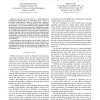143 search results - page 22 / 29 » Introducing Actions into Qualitative Simulation |
FLAIRS
2004
13 years 9 months ago
2004
er provides new techniques for abstracting the state space of a Markov Decision Process (MDP). These techniques extend one of the recent minimization models, known as -reduction, ...
IJCAI
2003
13 years 9 months ago
2003
Multi-robot learning faces all of the challenges of robot learning with all of the challenges of multiagent learning. There has been a great deal of recent research on multiagent ...
ICRA
2009
IEEE
14 years 2 months ago
2009
IEEE
— Traditional approaches to programming robots are generally inaccessible to non-robotics-experts. A promising exception is the Learning from Demonstration paradigm. Here a polic...
ICRA
2009
IEEE
14 years 2 months ago
2009
IEEE
— Our goal in this work is to make high level decisions for mobile robots. In particular, given a queue of prioritized object delivery tasks, we wish to find a sequence of actio...
COSIT
2009
Springer
14 years 2 months ago
2009
Springer
For an autonomous physical agent, such as a moving robot or a person with their mobile device, performing a task in a spatio-temporal environment often requires interaction with ot...

